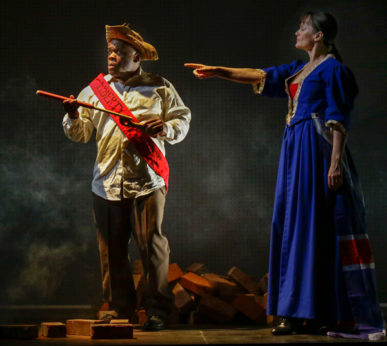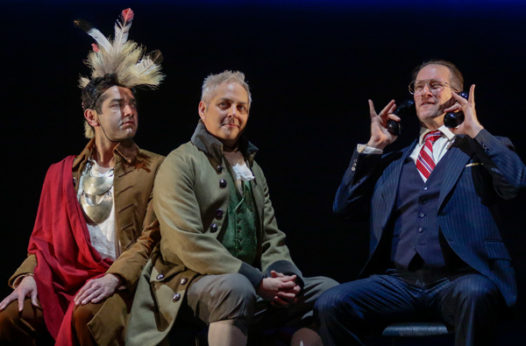
CULVER CITY—A whirlwind tour of U.S. and Polish history focusing on four periods—the American Revolution, the 1950s, the 1970s-’80s, and the modern-day War on Terror era—is now, but for just a short while longer, on the Kirk Douglas Theatre stage in downtown Culver City. Ameryka is a moving, educational piece of theatre that is highly watchable both for its freshly nonlinear content and its ingenious stagecraft.
Ameryka was written and directed by Critical Mass Performance Group Artistic Director Nancy Keystone, and plays only through Sunday, April 29.
This kaleidoscopic concoction introduces a number of important and representative figures from both cultures, often revealing the interface they shared across an ocean, and across the centuries. The central theme is the struggle for independence and freedom, which is never won once and for all but seemingly must be renewed in each generation.
The American Revolution, for example, did not resolve the problem of slavery, nor the expropriation of the land from the Indigenous peoples, nor the place of women in the new country, though this latter point goes unexplored in the play. And on the Polish side, the eventual re-establishment of an independent Poland in the wake of World War I did not prevent the country from falling under fascist influence in the 1930s, nor from being divided between the two superpowers to its west and east, Germany and the USSR, in 1939. In the post-war era, the struggle continued against Jim Crow racism in America, and the authoritarian rule of the Communist Party in Poland.
At first it appeared that the emphasis on the rise of the Polish Solidarity movement in the 1980s threatened to become an anti-Communist tirade; and to be sure, nothing in the play diverts attention away from the sins of communism to recognize whatever achievements the regime accomplished (like completely rebuilding a devastated country after World War II without the help of the Marshall Plan!). But in fairness it seems as though the dominant ideological proposition of Ameryka is that all governments fall short of their promise, often criminally so, in the pursuit of their vaunted and lofty stated aspirations—including the capitalist order that succeeded communism after 1989. The approach is perhaps more radical democratic or anarchist than anything else, while celebrating the fighting, self-sacrificing spirit of the people in every generation.

In the American Revolutionary era, Ameryka brings to the fore three main characters: Thomas Jefferson (Curt Bonnem), Enlightenment philosopher of the Revolution and committed slaveholder; Tadeusz Kościuszko (Jeff Lorch), Polish independence fighter who came to help the Americans at a time when there was little he could do at home; and the latter’s faithful aide Agrippa Hull (Ray Ford), a free Black man. Lorne Green plays a Jefferson slave, Jeremiah, who has escaped into the wild because he is on the royalist side, not trusting that the Revolution will do him any good at all and not believing the florid words of the Declaration of Independence. American Indians share an important historical fact with the Poles: Both saw their nations cease to exist.
In the 1950s we meet jazz musician Gene Jefferson (also Ray Ford), who considers moving to Poland to avoid the racism at home, barely recognizing that jazz (and he) are being used as weapons in the Cold War; a fellow musician played by Lorne Green; and the collective House Committee on Un-American Activities conducting a show trial of leading American progressives. A real highlight from that time is the cast of Polish jazz aficionados sitting around improvising a quick a cappella version of a John Coltrane tune. Tantalizing comparisons are drawn between American racism and Polish anti-Semitism.
In the 1970s and ’80s we get the Polish Solidarity movement, with activist Anna Walentynowicz (Valerie Spencer), the active role of the Church, a host of labor leaders including Lech Walesa, and government functionaries. On the American side we see conniving State Department officials surreptitiously giving aid to Solidarity in the form of money, communications, technology and broadcast equipment as part of the Reagan-era effort to bring the Soviet system down. At the same time the U.S. is arming the Islamic jihadists in Afghanistan so as to eradicate Soviet influence there, thanks to the delusional Cold Warrior CIA Director William J. Casey (Russell Edge). The irony is not lost that Reagan gives material aid to the workers of Solidarity while firing all the air traffic controllers (the only union that endorsed him in 1980!) who struck for better pay and working conditions.

And in the global war on terror after 9/11, we see the U.S. making it “worthwhile” for Polish government officials not only to provide troops for the “coalition of the willing” but also to offer a secret locale in Stare Kiejkuty, an out-of-the-way corner of Poland, where the Americans operate a black site for torturing captives transported in on untracked late-night flights.
The entire cast of nine pitches in with multiple roles in all these eras. Sometimes the stage is divided into two scenes, such as Gdansk 1980 and Montgomery 1955, or parallel church services. The backstage wardrobe area must be a veritable warehouse of costumes from all these historical periods. The two acts move quickly with mercurial fluidity, jumping totally out of temporal sequence to cover all this ground. The production is a tour de force that maximizes the availability of such a talented ensemble of actors, all of whom have mastered their Polish accents for the Polish scenes, and a variety of American accents as well. They move furniture and props around with speedy grace. It would not be too much to call Ameryka a kind of homemade spectacle, cleverly intersplicing events and persons who bear no discernible relationship with one another.
One comes away with hope in the power of mass human agency in a world where so few people are pure in their intentions. In one simple but exemplary scene set in a New York City gay disco in the 1980s, Polish émigré Wytold says that Gloria Gaynor’s “I Will Survive” became the virtual anthem of the resistance in Poland and he loves Ronald Reagan for aiding the Solidarity movement, while the American he meets there absolutely hates Reagan “for killing so many of my friends” by his inaction on AIDS research and treatment. “Sometimes the only thing you can do is dance,” he says.
On a personal note, I recall that in August 1980, when the Solidarity movement broke out in Gdansk, I happened to be traveling with a peace group for three weeks in the Soviet Union. Departing the country at the end of our trip, we left Brezhnev’s Moscow, briefly touched down in the Warsaw airport to change planes, then continued on to Paris. It was only when we got to France and had access to Western media that we learned of the workers’ uprising in Poland, about which likely only the most highly placed Soviet officials knew anything in the USSR.
Some on the left completely blamed Western propaganda and subversion for the downfall of the Soviet Bloc countries. A more balanced approach would also consider the heavy-handed response to popular discontent which drove masses of people in Eastern Europe countries to give up hope in their government leaders. Both of these factors are given their due in the play.
Ameryka has scenic design by writer-director Nancy Keystone, costume design by Lena Sands, lighting design by Adam J. Frank, sound design and original music by Randall Robert Tico, and projection design by Hsuan-Kuang Hsieh.
This year is the second for Block Party, a program of the premier non-profit theatre organization in L.A., the Center Theatre Group, which operates three venues: The Ahmanson for large-scale works, often touring Broadway productions; the Mark Taper Forum for more intimate stagings of both new and classic works; and the smaller Kirk Douglas Theatre in Culver City on the West Side. Block Party received 53 submissions from smaller theatre companies in the greater L.A. area. Each company was able to submit one production that opened between January 1, 2016, and May 30, 2017. Block Party chose three to remount at the Kirk Douglas: Playwrights’ Arena’s production of Bloodletting (March 29-April 8), Ameryka, and Celebration Theatre’s Die, Mommie, Die! (May 10-20).
Tickets for Block Party, including Ameryka, are available by calling (213) 628-2772, online, at the Center Theatre Group box office at the downtown Los Angeles Music Center’s Ahmanson Theatre, or at the Kirk Douglas Theatre box office two hours prior to performance. Remaining performances are Thurs. the 26th at 8 pm, Friday the 27th at 8 pm, Saturday the 28th at 2 and 8 pm, and Sunday the 29th at 1 and 6:30 pm. The Kirk Douglas Theatre is located at 9820 Washington Blvd. in Culver City 90232. Free three-hour covered parking at City Hall with validation (available in the Kirk Douglas Theatre lobby).







